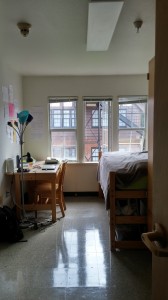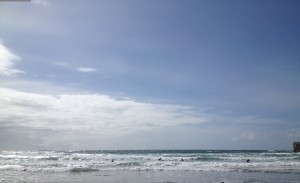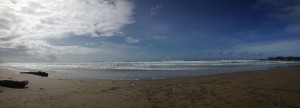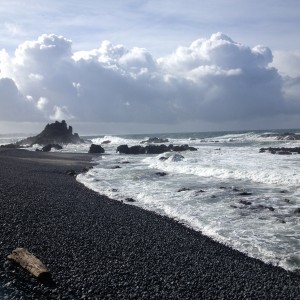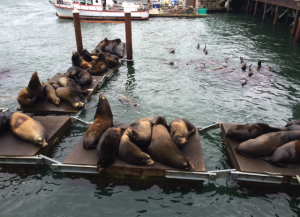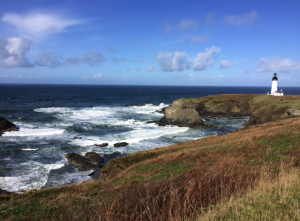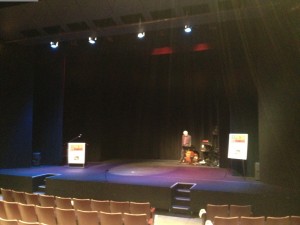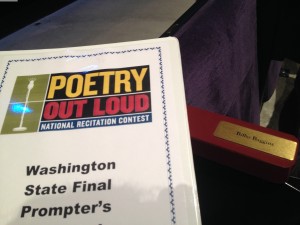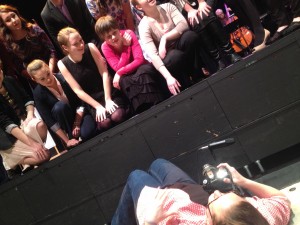In which Daniel showcases both the drab landscape that is his dormitory and some rather amusing doodles.
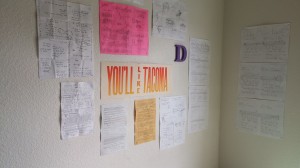
Of all the college dorm rooms that I have ever visited, mine is by far the most barren. Textbooks necessary for the semester’s courses sit in piles on my bookshelf, the small ocean of clothes I brought from home is stuffed into my dresser, and on my desk is nothing but my laptops, a lamp and some spare sheets of scratch paper. When I was a first year student at Puget Sound, I made the usual assumption that I would need so much more than I truly did – extra books, extra bedding, extra clothes and items of little use but nostalgic significance. By my junior year, I have since learned that moving in and out of one’s dormitory is much easier if there are fewer items to transport, and moreover, that much of what I thought I needed at college I either did not need or could find elsewhere.
On the wall above my desk, however, a few papers have been pasted with a combination of musical sketches, lines of poetry and doodles. These are papers of my musings that I began pasting to my wall at the beginning of this year, and each time I have filled a page, I have given it a place on the wall above my desk. Somewhere on nearly all of these papers is scribbled the phrase “Write What You Hear.” This phrase is not mine to take credit for, but an unwitting gift from a woman named Minah Choi.
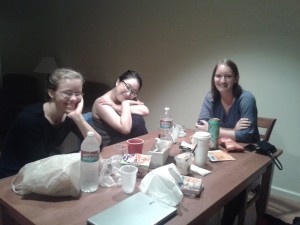
Minah Choi pictured center.
Minah Choi and I met over the summer of 2014, when we both attended a chamber music and composition program called California Summer Music (CSM). Roughly 70 string and piano players and 10 composition students across the U.S. were selected to attend, ranging from middle school students to graduate students, and across the program’s three weeks, were intensely trained by guest professors and lecturers. Throughout the three weeks, both faculty and students performed concerts of chamber music, and at the program’s conclusion, each composition student had one piece performed by a student ensemble.
Like me, Minah was a composition student, but unlike me, she was ever so slightly a musical genius, a little gorgeous, and very much a graduate student. Needless to say, I was rather intimidated. Being so young in comparison, having had so much less experience, and coming from a university without a real composition department, I felt very small in her presence.
Being her magnanimous self, Minah decided that she and I would be friends, and to my surprise, I spent the next three weeks under her humorous and good natured mentorship, allowing her to poke and prod me in the right direction. In her adorable Korean accent, she gave me so much great advice, ranging from approaches to wardrobe (“Are you going to be comfortable in that? Yes. Do you care that it looks funny? You should not!”) to leadership (“Sometimes, you just gotta drag them in the right direction while they are kicking and screaming. You just gotta keep smiling all the way too”). But the best advice that Minah ever gave me was after the performance of my piece “Sema in Miniature: For Violin, Cello & Piano”, on the last day of the program.
“It was not the best piece, no,” she remarked as we stood in line at a taqueria. “But it was the most ‘you’ of the pieces – you know what I mean? Of all the students here, you wrote the piece that was the most yours.” She nodded sagely, bobbing her head back and forth as she decided upon her lunch. “This is the most important, you know? You can’t write because you wanna impress someone or sound like someone. You just gotta write what you hear.”
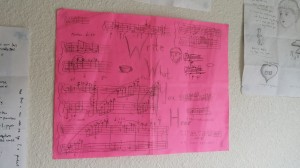
It was not until September arrived that the phrase resurfaced in my memory. Once there, however, I could do nothing to rid myself of it, and I found myself writing it over and over again on blank bits of paper. Eventually, I came to think about what the phrase meant, and once I did, I couldn’t help but feel liberated by it. What a wonderful idea, I realized, to make no attempt to sound like another composer or write in a specific way, but rather to put on paper whatever I hear in my head! It is simultaneously so much harder and so much easier than writing to be heard by a specific audience – harder because you cannot allow one model to dictate your creation, but easier because the connection between you and what’s on the page becomes so much more straightforward.
Looking at my dorm room now, there still is little in it. Although crammed with my tiny and cramped handwriting, there are still few pages adorning my walls. The ideas on those pages, however, are in many ways some of the best I’ve ever had, and even looking at the ideas which never came to fruition, I feel accomplished. Perhaps it’s just the physical act of filling a page with my words and thoughts, or the knowledge that I am capable of creation, but I must admit my debt to Minah Choi.
